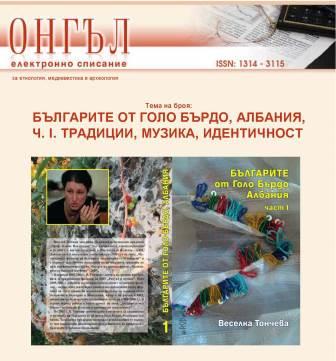Българите от Голо Бърдо, Република Албания. Традиции, музика, идентичност. Част 1
The Bulgarians from Golo Bardo , Albania. Traditions, Music, Identity. Part 1
Author(s): Veselka TonchevaSubject(s): Cultural Essay, Political Essay, Societal Essay
Published by: Асоциация за антропология, етнология и фолклористика ОНГЬЛ
Summary/Abstract: The book “The Bulgarians from Golo Bardo, Albania. Traditions, Music, Identity” presents a society, not enough known not only in Bulgaria, but on the Balkan Peninsula as well. This society – the Bulgarians from Golo Bardo, Republic of Albania, has an interesting historical fate. After declaring of the independence of Albania in 1912-1913 and the constitution of its new boundaries, 21 villages in the region of Golo Bardo were situated on the territory of east Albania and six – in present Republic of Macedonia. Bulgaria has active contacts with these people until the Second World War, followed by “isolation” for more than 40 years. Only in the beginning of 1990s, after the falling of the regime of Enver Hodzha and the opening of the Albanian boundaries, the Bulgarians showed again social and scientific interest in these lands. The self-definition of this society tends more often to be shown as “Bulgarians” (in some cases – as “Macedonians”), but the historical data state that till the beginning of 20 c. the national definition of Golo Bardo was only a Bulgarian one, apart from the region Macedonia. The external (for the society) name is “Bulgarians” – under this name are known people from Golo Bardo among the Albanian population from the whole Albania. The confession of Bulgarians in Golo Bardo divides into Islam (in higher percentage) and Christianity. The accepting of Islam happens relatively late (probably about 18 c.) and in the local narrative sources present memories about the Christian past of these people. Many settlements of Golo Bardo used to have at the same time both churches and mosques. After 1967, the official state politics in Albania banned all religions, which influences the religious life and traditions of these Bulgarians. The language of this society, known as “Bulgarian” could be defined as West Macedonian Bulgarian dialect. This is a language, used for communication only inside the society and family environment and exists only in spoken type. During the time of the regime of Enver Hodga, the use of this language in the public space and places is not quite desirable and this turns the language into a “domestic” language. Today in Golo Bardo are still elder people, which do not speak Albanian language at all. The statute of the population of Golo Bardo is not of “Bulgarian” minority, because the Albanian state does not recognize such one. In recent years, in diplomatic relations between Albania and Bulgaria appears the question of recognizing the “Bulgarian” minority in Albania, but it is not solved up to now. The present book falls into two parts – a scientific text and terrain materials. The scientific text deals with important aspects of the history, religion, traditional calendar and family rituals, the music and identity of the Bulgarian society. The terrain materials are recorded in the villages Steblevo, Klenie and Vormitza, as well as among the migrants from Golo Bardo in the cities Tirana and Duras...
Journal: Електронно списание »Онгъл«
- Issue Year: 2014
- Issue No: 6
- Page Range: 1-328
- Page Count: 328
- Language: Bulgarian

